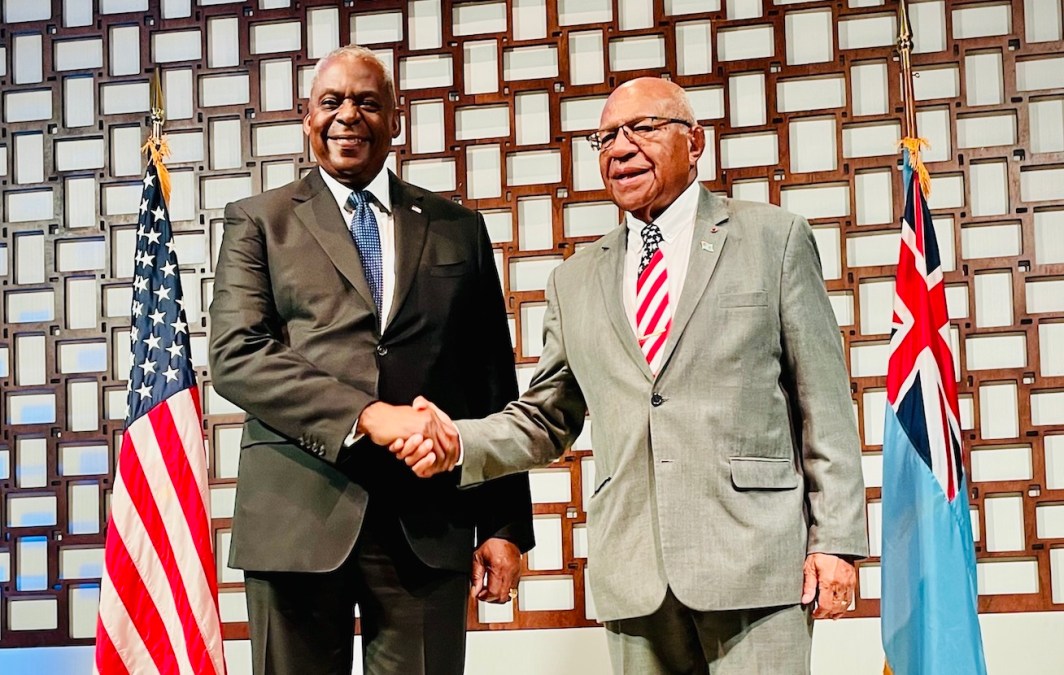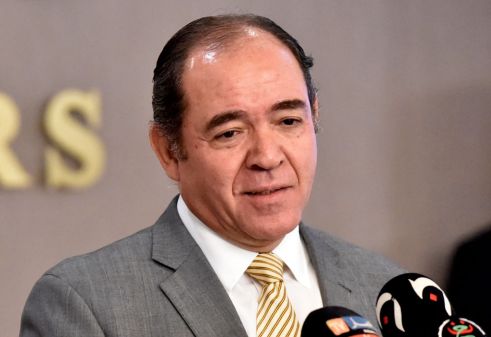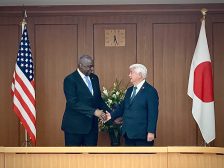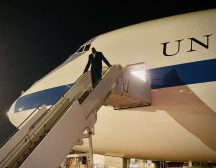US and Fiji unveil new, multifaceted plans to deepen military cooperation

BLACKROCK CAMP, Fiji — The Pentagon is set to supply the Fiji Military Forces with new maritime assets and (pending Congress’ approval) $4.9 million in security assistance to help modernize and professionalize the island nation’s battalions, U.S. Defense Secretary Lloyd Austin told reporters on Nov. 23.
Speaking at a press briefing in the capital city of Suva alongside Fiji’s Prime Minister Sitiveni Rabuka, Austin and his counterpart unveiled plans to deepen their militaries’ cooperation in the near term — including negotiations on a new Status of Forces Agreement (SOFA) that would enable American and Fijian personnel to operate jointly on the same bases and train side-by-side on a more routine cadence.
“We discussed the unique and various security challenges in the Pacific Islands region. Maritime security is essential. So, I’m pleased that our first delivery of rigid-hull inflatable boats will arrive in the next several months. Soon after, we’ll deliver a new boat ramp to support maritime patrols of your borders, and we’ll continue expanding our exercises and engagement together,” Austin said.
His stop in Fiji marked the first time in history that a U.S. defense secretary toured the country. And it was the final leg of Austin’s latest weeklong trip to four nations across the region, after he visited Australia, the Philippines and Laos.
In each location, the Pentagon chief and his counterparts underscored their commitments to collaboratively promote a “free and open Indo-Pacific,” particularly as China continues to flex its military presence there.
A senior defense official who previewed the Defense Department’s top objectives with Fiji ahead of the main events, said part of the ultimate aim is for the militaries to jointly plan and “be more present together in the region.”
Pointing to recent conversations with their Fijian partners, the official said the forces align on many overarching objectives.
“They certainly want a more capable military. They want a more professionalized military — and they’ve told us this directly. They want ways to train with the United States so they can, again, build that capacity. And they also want to be more able and more efficient and effective in responding to regional needs, from humanitarian assistance projects to disasters. It’s really important,” the senior defense official said.
During that sidelines briefing with the traveling press corps, and in Austin’s meetings with American and Fijian journalists on the following day, officials shed light on the mechanisms and deliverables through which the countries’ militaries are moving quickly to expand cooperation.
Notably, they revealed that their governments recently kicked off formal negotiations on a Status of Forces Agreement that, once signed, will legally permit deeper collaboration through bilateral exercises and other mil-to-mil engagements.
Ahead of that announcement, senior defense officials told reporters that working more closely with the Fiji Military Forces will offer U.S. troops the strategic benefit of diversifying their own force posture in and around the Indo-Pacific region.
“The SOFA will enable us to deploy and redeploy forces in support of Fiji and help us train with the Fijians on a very routine basis. I look forward to routine rotations, training rotations — where possible — to be conducted. There is no notion of any permanent basing to be established here in Fiji. We did not have any discussions like that, but we do enjoy training with our great partners here in Fiji and look forward to more of that in the future,” Austin told reporters.
The defense secretary also announced that the two nations signed an Acquisition and Cross Servicing Agreement to speed up their transfer of resources and logistics capacity, and allow each military to access the other’s maintenance facilities during emergencies.
According to the senior defense official, ACSAs are “a default” between the U.S. and its closest partners — and this one with Fiji is the result of nearly a decade of negotiations.
Austin’s other major announcement at the briefing was that America will provide $4.9 million in foreign military financing for small-arms recapitalization to the Fijian forces, if lawmakers approve it.
“This will go really straight to what they’re asking for and what their needs are,” a senior defense official said.
In response to questions from reporters from both nations, military and political leaders expressed confidence that the U.S. commitments to Fiji would continue under the incoming Trump administration.
They also emphasized their countries’ shared intent to prioritize safety and security across the Indo-Pacific.
“We all pray [this deepened partnership is] not an indication that we are looking at some dangerous years ahead. We’re here to talk about peace and how we guard, and protect, and promote that peace,” Fiji’s PM Rabuka said.






